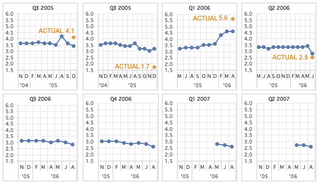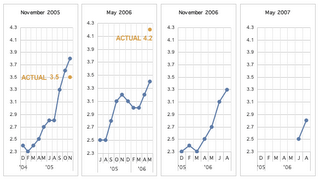Personal income increased $60.2 billion, or 0.5 percent, and disposable personal income (DPI)
increased $63.9 billion, or 0.7 percent, in July, according to the Bureau of Economic Analysis.
Personal consumption expenditures (PCE) increased $78.7 billion, or 0.8 percent. In June, personal
income increased $60.0 billion, or 0.6 percent, DPI increased $47.8 billion, or 0.5 percent, and PCE
increased $36.6 billion, or 0.4 percent, based on revised estimates.
Personal Income and Expenditures were in line with market expectations. The inflation numbers in the report were also in line with expectations.
U.S. factory orders fall 0.6% in July
WASHINGTON (MarketWatch) - Demand for U.S.-made factory goods fell 0.6% in July on a large drop in orders for transportation goods, the Commerce Department said Thursday. Excluding the 10.1% decline in transportation orders, factory orders rose 1.1% in July, the government said. The 0.6% decline was slightly stronger than the 0.9% drop expected by economists surveyed by MarketWatch. Shipments of factory goods were unchanged in July. Factory inventories increased 0.6%, the ninth increase in the past 10 months. The inventory-to-shipments ratio rose to 1.17 from 1.16.
The ex-transportation number +1.1% was pretty good. Transportation orders (aircraft mainly) are very volatile so excluding that portion gives a better idea of activity.
U.S. Aug. Chicago PMI 57.1, close to expectations
WASHINGTON (MarketWatch) - Business activity in the Chicago region decelerated slightly, but continued to expand at a moderate pace, according to NAPM-Chicago. The Chicago purchasing managers index fell to 57.1% in August from 57.9% in July, the private group said Thursday. The decline was in line with economists' expectations, according to a survey conducted by MarketWatch. Readings over 50 indicate growth in the region. Economists use the Chicago index to gauge the August national business index to be released on Friday by the Institute for Supply Management. Economists expect the Aug. ISM factory index to hold steady at 54.7%.
The Chicago PMI was about as expected and indicates further expansion. The national ISM survey will be out tomorrow.
Overall the reports out this week have all been Fed friendly. Tomorrow we get the employment report but unless it's way out of line, don't expect much market movement in this pre-holiday week.

